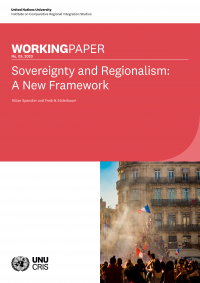Sovereignty and Regionalism: A New Framework

National sovereignty may be the single most important variable for explaining the rather puzzling variation in levels of regional cooperation and institutionalisation across regions and policy fields. However, theorists and policymakers are often trapped in narrow discussions about whether national sovereignty has been delegated to and pooled within regional organisations. Instead of treating national sovereignty as a fixed and monolithic variable with distinct ‘sovereignty costs’, our constructivist perspective opens up for a wider set of ideas about how national sovereignty is related to and influences regionalism.
Our framework makes a core distinction between instrumental, principled and status-oriented national sovereignty narratives, which enables us to recast the relationship between national sovereignty and regionalism in a way that is sensitive to different spatial and functional contexts. It also helps us capture how the co-existence of different sovereignty narratives frame foreign policy choices about regionalism. The openness of this approach makes it particularly amenable to comparative work on the striking variation in regionalism across policy fields, regions, and time. The paper ends by outlining a research agenda to explore the role of national sovereignty in regionalisms around the world, which we argue can help move the field away from the largely instrumentalist (even essentialist) notions of national sovereignty in mainstream and Eurocentric regional integration theory.
